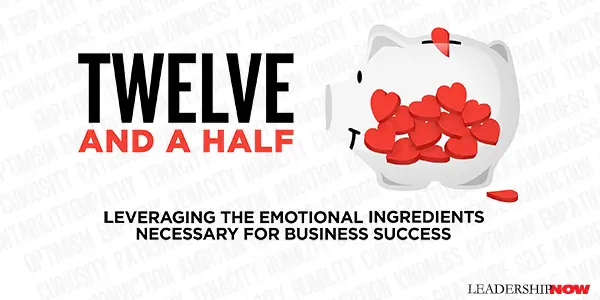 |
 |
01.05.22

Twelve and a Half: Leveraging the Emotional Ingredients Necessary for Business Success
IT’S NOT surprising that the “growth potential of most businesses is limited by the emotional intelligence of their leaders,” writes Gary Vaynerchuk in Twelve and a Half: Leveraging the Emotional Ingredients Necessary for Business Success. (And it’s 99% free of the language you have come to expect from Vaynerchuk.) The soft skills always have mattered, but they are hard because we have to work on ourselves. (It is incidentally why no one is a born leader.) Because they are hard, we avoid developing them as we should if we can get by with it. And through various periods of history, we could. Today, we can’t—and shouldn’t. Vaynerchuk states that “modern society’s definition of a ‘smart business decision’ is disproportionately predicated on analytics. Business leaders tend to find safety in the ‘black-and-white.’ They find safety in the academics, math, hard data, and what looks good on spreadsheets.” He believes that it is the soft skills is the strength that “will help you survive and flourish.” He identifies twelve ingredients of emotional intelligence free from the ranting you often hear on this subject that comes across as a way to make the ranter look with it. (There is a thirteenth ingredient—candor—that he gives half because it is something he struggles with—balancing kindness with candor.) He emphasized that all twelve are important and, while equally valuable, they “must be deployed in different proportions in different situations. As you navigate every second of your life, you need to add different ingredients at different times.” Here are the twelve with selected Vaynerisms: 1. Gratitude Gratitude is a perspective on life. We panic when we compare ourselves to others. “People look upward at those who rank higher, but they don’t look downward at the billions ranked lower.” We have more to be grateful for than we think. “Be thoughtful and honest with yourself about your missteps, but don’t start dwelling on them,” or it will become the jail you live in. There’s no value in that, says Vaynerchuk. In the face of disappointment, gratitude is my chess move to limit dwelling on it. 2. Self-Awareness It’s one thing to be self-aware. It’s another thing to look in the mirror and say, “Hey, you’re not good at X.” 3. Accountability I think of accountability as the brakes. It stops the momentum of pain that comes from blaming others. 4. Optimism Choosing optimism over pessimism is, at the end of the day, wildly practical. It doesn’t mean being naïve or blind to the downsides in business or in life. In fact, I’m more aware than most about what could go wrong. I just believe I’m capable of navigating any challenge. 5. Empathy Empathy is my ear to the ground. It naturally pairs with curiosity. 6. Kindness [Kindness] is about being kind to those who have put me in a difficult position. 7. Tenacity Tenacity should never equal burnout. 8. Curiosity Curiosity mixed with empathy can lead to intuition. Then, after experiencing or “tasting” that intuition, you can develop conviction. 9. Patience When you have a good relationship with time, the pressure is lifted, and you can do so much more. 10. Conviction Conviction is the north star that keeps you on track, helping you be tenacious throughout your journey, despite the inevitable difficulties. Without conviction, you’ll miss big opportunities and lose because of other people’s opinions, which is most devastating of all. 11. Humility Humility is a requirement if you want to cultivate a lasting positive reputation and leave an admirable legacy. Leaders can’t sustain success without it. 12. Ambition People tend to have an unhealthy relationship with ambition partly because they use it as a cover-up for their insecurities. Some people set goals to build successful businesses or secure prestigious titles in organizations so they can prove something to their parents, their significant others, or their high school friends who doubted them. Their ambitions are great, but their motivation is based more on insecurity than curiosity or self-awareness. Part Two of the book gives a number of real-life scenarios after which Vaynerchuk gives his perspective on which ingredients would have worked best in that context. It is helpful in understanding how these twelve ingredients work together for a good outcome. His responses include: By starting with empathy and curiosity, you can get clearer feedback. Then accountability and conviction can help you decide what to do next. Part Three concludes the book with exercises to help you develop and grow in each of these twelve areas. 
Posted by Michael McKinney at 07:20 AM
|
BUILD YOUR KNOWLEDGE
 

How to Do Your Start-Up Right STRAIGHT TALK FOR START-UPS 
Grow Your Leadership Skills NEW AND UPCOMING LEADERSHIP BOOKS 
Leadership Minute BITE-SIZE CONCEPTS YOU CAN CHEW ON 
Classic Leadership Books BOOKS TO READ BEFORE YOU LEAD |